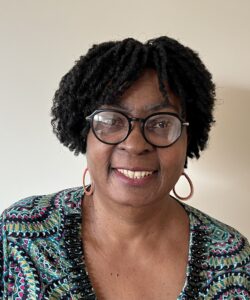 Angela Carter, Visiting Assistant Professor of Africana Studies
Angela Carter, Visiting Assistant Professor of Africana Studies
Angela Carter is a Visiting Assistant Professor of Africana Studies specializing in Psychological Science. Her research interests focus on the development of cultural meaning-making practices, psychohistory, Black intellectual genealogies, public history, and the socialization of racial and cultural identity. Before joining UMBC, Dr. Carter was a researcher at the Ronald W. Walters Leadership and Public Policy Center in Washington, D.C.
As a double alumna of Howard University, she earned a B.S. in Psychology, a B.A. in Afro-American Studies, and a Ph.D. in Personality Psychology. Dr. Carter is a Phi Alpha Theta National History Honor Society member and recipient of the Winslow Sargeant Doctoral Award.
At UMBC, Professor Carter teaches introductory and psychological courses exploring the Black experience in the U.S.
Office: 536 Fine Arts Building
Contact: (410) 455-2926|acarter8@umbc.edu
 Gloria Chuku, Professor and Chair of Africana Studies
Gloria Chuku, Professor and Chair of Africana Studies
Areas of Interest: African History, Gender, African Diaspora
Ph.D., University of Nigeria, Nsukka
Gloria I. Chuku is Professor of Africana Studies with a specialty in African History and the Department Chair. She is Affiliate Professor of the Gender, Women’s + Sexuality Studies Department and Language, Literacy, and Culture PhD Program at the University of Maryland, Baltimore County, USA. Her research has focused primarily on Igbo history, women in colonial and postcolonial political economies of Nigeria and Africa, ethnonationalisms and conflicts in Nigeria and Africa, African nationalism and intellectual history, and gender and African Diaspora. Professor Chuku is the author of Igbo Women and Economic Transformation in Southeastern Nigeria, 1900-1960 (Routledge, 2005); editor of The Igbo Intellectual Tradition: Creative Conflict in African and African Diasporic Thought (Palgrave Macmillan, 2013) and Ethnicities, Nationalities, and Cross-Cultural Representations in Africa and the Diaspora (Carolina Academic Press, 2015); coeditor of Women and the Nigeria-Biafra War: Reframing Gender and Conflict in Africa (Lexington Books, 2020); and over 70 scholarly journal articles, book chapters, and encyclopedia entries. She has presented her work across Nigeria and the United States and in Brazil, Canada, Italy, Jamaica, Senegal, South Africa, South Korea, Sweden, and Uganda.
Professor Chuku teaches courses in African history, contemporary Africa, contemporary African politics, West African history, Islam in Africa, African culture and development, and women in Africa and the Diaspora. She serves on the Advisory and Editorial Boards of such journals and presses as the Journal of Genocide Research, History in Africa, Lagos Historical Review, Taylor and Francis Book Series on Global Africa, and Lexington Books’ African Governance and Development Series. Professor Chuku is the recipient of a number of distinguished awards, including the Lipitz Professor of the Arts, Humanities, and Social Sciences (2020) and the prestigious Ali Mazrui Award for Scholarship and Research Excellence (2017).
Office: 537 Fine Arts Building
Contact: (410) 455-2921 | chuku@umbc.edu
 Ailton Colman, Associate Professor of Africana Studies
Ailton Colman, Associate Professor of Africana Studies
Dr. Ailton Coleman is an Associate Professor in the Department of Africana Studies at the University of Maryland, Baltimore County. His teaching and research examine the intersections of gender, race, and health, with a particular focus on how masculinities and fatherhood influence health behaviors and outcomes. Dr. Coleman earned dual Bachelor of Arts degrees in Spanish with concentration in Language and International Business, and in Political Science (International Affairs) from Georgia State University, where he was recognized as a Georgia HOPE Scholar. As a Paul D. Coverdell Peace Corps Fellow at the University of Arizona, he conducted research in community nutrition education and obesity prevention while completing the Master of Public Health in Public Health Policy and Management. He subsequently pursued doctoral training in Public Health with a focus in Social and Behavioral Health Sciences at the University of Connecticut as a Codero-Crandall Fellow, followed by postdoctoral studies as an Oak Ridge Institute of Science and Education (ORISE) Fellow in program evaluation with the U.S. Army Public Health Center. Additionally, Dr. Coleman completed the NIH National Heart, Lung, and Blood Institute’s Obesity Health Disparities PRIDE Fellowship for early-career investigators.
His scholarship has been published in Phylon—the only peer-reviewed journal established by W. E. B. Du Bois—as well as in the Journal of Black Studies, Translational Behavioral Medicine, Journal of Nutrition Education and Behavior, and Psychology of Men and Masculinities. Dr. Coleman’s expertise has been featured in multiple media platforms addressing the relationship between manhood, masculinities, and health. In addition to his academic work, Dr. Coleman has engaged extensively in international humanitarian service, including his tenure as a United States Peace Corps Volunteer in the Republic of Kiribati, known as “the Cinderella of the Pacific.” In 2025, he was elected Chair of the Council on Black Health, underscoring his leadership in advancing health equity.
Office: 540 Fine Arts Building
Contact: (410) 455-1891 | coleman.africana@umbc.edu
 Tammy Sanders Henderson, Associate Teaching Professor
Tammy Sanders Henderson, Associate Teaching Professor
Tammy Sanders Henderson is Associate Teaching Professor of Africana Studies. Her teaching and research interests include Africana Studies, African American women’s studies, black family history, African American popular culture, race and social justice, and public policy. Dr. Henderson is an affiliate faculty member in the Gender, Women’s + Sexuality Studies department, the Language, Literature, and Culture Doctoral Program, and a faculty member for the First Year Seminar program.
Dr. Henderson is the author of “He says that before I should have my children he will blow their brains out”: The Battle between African American Parents and the Maryland’s Orphans’ Court in the Nineteenth Century,” in Women, Gender, and Families of Color 11, no. 2 (Fall 2023); and co-author of “‘You Have to Humanize Your Feelings’: Black Fathers’ Reflections on How Youth Violence Prevention and Perpetration Influence Their Overall Health and Fathering Practices,” in Social Work and Public Health (2024) and “Interrogating the Awkward Black Girl: Beyond Controlling Images of Black Womanhood in Televised Comedies,” in The Routledge International Handbook of Communication and Gender (Routledge, 2021).
Office: 539 Fine Arts Building
Contact: (410) 455-2928 l xu61256@umbc.edu
 Thomas Robinson, Assistant Professor of Africana Studies
Thomas Robinson, Assistant Professor of Africana Studies
Areas of Interest: Psychology, Research Methods
Before joining the department, Dr. Robinson was a statistician at the National Center for Health Statistics [1967-69], an Equal Employment Opportunity Counselor at the NIMH [1976-79], and a consultant to the Equal Employment Opportunity Commission [1977]. He was also a summer intern at the National Science Foundation [1971] and a postdoctoral fellow at the NIMH-Laboratory of Psychology and Psychopathology [1975-79].
Past recent interests centered on the efficacy of polygraph or lie detection measurement as well as psychophysiological [e.g., electrodermal and heart] responding as related to such variables as auditory and visual two-flash perceptual sensitivity, schizophrenia spectrum disorders, psychoticism, schizotypal personality, postural stress, direction of hand torque and hand preference, differential reaction times of personality groupings, and racial differences in electrodermal responding and non-responding. Behavioral responses associated with and psychometric properties of various personality measures [e.g., sensation seeking, introversion-extraversion, neuroticism, shyness, and state and trait anxiety] were also studied.
Current research interests center largely on two issues: romantic jealousy as influenced by gender and personality differences; and the evolutionary origins of implicit and explicit prejudicial attitudes. A book-length manuscript examining how evolutionary factors appear to influence the development of prejudicial attitudes is currently being written.
Courses taught in the department include: Psychology of Racism, Psychology of the Black Experience, Methodology and Research in Africana Studies, Research Design and Documentation, Research Proposal Fundamentals, Psychological Testing of American Minorities, Mental and Physical Health of Black Americans, and The Effects of Violence on Children in Inner-City Communities.
Contact: trobinso@umbc.edu